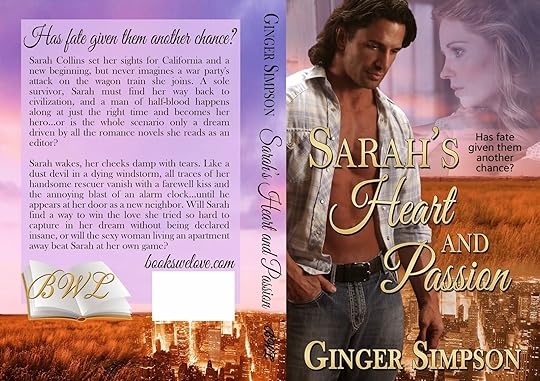Ginger Simpson's Blog, page 77
August 21, 2014
GET STARTED & KEEP WRITING BY RITA KARNOPP
 We all want to finish that book – or we wouldn’t be reading articles on writing – I get it. But there’s always that insecurity that nags at us – can I really write a book, and if I do will anyone want to buy it?
We all want to finish that book – or we wouldn’t be reading articles on writing – I get it. But there’s always that insecurity that nags at us – can I really write a book, and if I do will anyone want to buy it?No one can really answer that question until you just do it. Finish that book, rewrite, have it edited and then sent your baby out in the world. That’s the only way you’re going to know for sure – right?
So many people have written a book because the one they were reading disappointed them to the point they believed they ‘could do better.’ Whatever motivates you – hang on to it! Let it drive you to writing the best book you can.
But, here comes some hard truth. It’s not all that easy. Once you’re sitting in front of that blank, white screen – reality hits. There’s more to writing than one could imagine.
You might consider studying the art of writing – come on – I’m serious. Do you think a dancer gets out on the stage without watching successful dancers, going to dance lessons, and practice …practice…practice?
Do you believe you’ve studied the craft and are ready to start typing? Well, develop your story plot; give it a tentative beginning, middle, and end. You’ll never create a well-thought out plot if you don’t do a little planning. Know you can give your characters license to change things as the story unfolds, but a bit of guidance along the way will give you a great first draft.
Don’t polish it as you go – don’t second-guess yourself - right now you want to get that story down on paper, type to the finish as fast as you can. If you get stuck, that’s okay. You might ask yourself; ‘What would I do –if I was in this predicament?’
You might do what I do. I go to bed and let it workout while I sleep. Yep, I go to bed and think about my story. I run it through my mind like a movie. It may sound strange, but when I sit back down at my desk to write – my fingers fly across the keyboard. My characters have worked out the problem and have thought of more interesting challenges to face.
Keep your chapters about the same length. I find my pacing is around fifteen pages per chapter – you’ll find your own pacing the more books you write. Keep in mind when you end a chapter, it should prompt the reader to keep reading. You don’t want them to put the book down – even for a night. End those chapters with cliffhangers and keep them reading.
Whatever you do, treat your writing time with the same respect as you do your full-time job. You’re in charge of what you do in a day, right? You’ll never finish your
 book unless you set goals and stick to them. Keep writing – and I promise you’ll be soon typing ‘the end.’
book unless you set goals and stick to them. Keep writing – and I promise you’ll be soon typing ‘the end.’ The self-gratification you’ll feel - will be like nothing you’ve ever experienced. You did it! Celebrate . . . then start the rewrites!
Published on August 21, 2014 01:00
August 20, 2014
A Page Straight From D.G. Driver - #apagestraightfrom
 Cry of the Sea
byD.G. DriverThey must be surfers, was all I could think as I ran toward the three squirming bodies. Who else would be in the water this early in the morning? But even for surfers, this was pretty early. They’d have to have been surfing in the dark. That didn’t make any sense. Were they crazy? I knew some surfers at school, and they were definitely nuts sometimes, but surfing before the sun rose seemed extreme even for them.Well, crazy or not, they didn’t deserve to be caught in an oil slick. I crashed down to my knees beside the bodies and dropped my gear. I started to reach out my hand to tap them and see if they were all right without even stopping to get a good look at them. But before I touched any of them, my arm recoiled back to my side."Dad!" I screamed. "Oh my God! Dad!"My dad rushed up behind me. "Are they alive?" he asked, trying to catch his breath."I… I…"Words didn’t come. I couldn’t formulate a thought. I was too startled. These three figures lying in the sand in front of me weren’t surfers at all.They weren’t even people.From their facial features and upper torsos, they looked kind of like women, but all three of them had silver-colored skin. They were bald, with strange ridges marking their skulls. None of them seemed to have ears, only holes in the sides of their heads. No nose was visible, not even a bone or nostrils filled that space between their eyes and mouths. Although their mouths seemed to be moving, they were actually breathing through what looked like gills in their necks.And if that wasn’t weird enough, instead of legs, their upper torsos stretched out into long, scale-covered, silver fishtails. If I had to say what these things stranded in front of me, splattered with oil, appeared to be, I’d say mermaids. And no, they didn’t look like they’d start singing songs or granting me wishes. They looked a little bit scary—but fragile too. Most of all, they looked like they were going to die, and no handsome prince was there to kiss them and keep them from turning into sea foam."June," my dad whispered. "Do you think they’re real?""Yes," I whispered back. "Strange but very real.""You don’t think they’re costumes?" he suggested. "Maybe some costume party on a yacht last night—they fell off."Sometimes my dad’s brain worked even more off-kilter than mine. I shook my head. "Those are not costumes, Dad."Those beings lying there in the sand were not wearing anything that was cut or stitched together. What I saw wasn’t material. It wasn’t a lycra suit like on Catwoman, nor was it some kind of make-up like that chick from X-Men. Make-up would’ve been washed away.
Cry of the Sea
byD.G. DriverThey must be surfers, was all I could think as I ran toward the three squirming bodies. Who else would be in the water this early in the morning? But even for surfers, this was pretty early. They’d have to have been surfing in the dark. That didn’t make any sense. Were they crazy? I knew some surfers at school, and they were definitely nuts sometimes, but surfing before the sun rose seemed extreme even for them.Well, crazy or not, they didn’t deserve to be caught in an oil slick. I crashed down to my knees beside the bodies and dropped my gear. I started to reach out my hand to tap them and see if they were all right without even stopping to get a good look at them. But before I touched any of them, my arm recoiled back to my side."Dad!" I screamed. "Oh my God! Dad!"My dad rushed up behind me. "Are they alive?" he asked, trying to catch his breath."I… I…"Words didn’t come. I couldn’t formulate a thought. I was too startled. These three figures lying in the sand in front of me weren’t surfers at all.They weren’t even people.From their facial features and upper torsos, they looked kind of like women, but all three of them had silver-colored skin. They were bald, with strange ridges marking their skulls. None of them seemed to have ears, only holes in the sides of their heads. No nose was visible, not even a bone or nostrils filled that space between their eyes and mouths. Although their mouths seemed to be moving, they were actually breathing through what looked like gills in their necks.And if that wasn’t weird enough, instead of legs, their upper torsos stretched out into long, scale-covered, silver fishtails. If I had to say what these things stranded in front of me, splattered with oil, appeared to be, I’d say mermaids. And no, they didn’t look like they’d start singing songs or granting me wishes. They looked a little bit scary—but fragile too. Most of all, they looked like they were going to die, and no handsome prince was there to kiss them and keep them from turning into sea foam."June," my dad whispered. "Do you think they’re real?""Yes," I whispered back. "Strange but very real.""You don’t think they’re costumes?" he suggested. "Maybe some costume party on a yacht last night—they fell off."Sometimes my dad’s brain worked even more off-kilter than mine. I shook my head. "Those are not costumes, Dad."Those beings lying there in the sand were not wearing anything that was cut or stitched together. What I saw wasn’t material. It wasn’t a lycra suit like on Catwoman, nor was it some kind of make-up like that chick from X-Men. Make-up would’ve been washed away.What I saw was real skin. Or some kind of skin, if skin could be silver. And those were real scales, not some kind of pointy sequins. I’d been around enough fish to know the difference. Besides, if these were a couple drunk, rich women in costumes, they’d be dead already. I knew these creatures weren’t dead, because the one closest to me suddenly opened its eyes and focused them right at me.Buy Link
Published on August 20, 2014 00:00
August 19, 2014
DO YOU REALLY WANT TO WRITE? BY RITA KARNOPP
 So you’ve received a rejection letter – and you’re in the middle of writing yet another book. Suddenly you’re in the slumps and wonder if all this work and upset is worth it. You stop writing – and now you just don’t feel like going back to your office and continue with your work in progress.
So you’ve received a rejection letter – and you’re in the middle of writing yet another book. Suddenly you’re in the slumps and wonder if all this work and upset is worth it. You stop writing – and now you just don’t feel like going back to your office and continue with your work in progress.Hmmm . . . sound familiar? It’s not an easy profession, is it? We have our highs – and oh so many lows. It’s not easy to receive a rejection letter on one of our books. It’s deflating. It’s frustrating. It’s depressing. Yet, after you cry, throw a tantrum, crumple the rejection letter and toss it in the trash – you take a deep breath – and ask yourself – “Should I keep writing – or quite?”
I’ll bet everyone who has written a book, whether published or not, has asked themselves that very question. It’s hard work to be a writer. Life has a way of pulling at us – whether fun or work – and it take determination, fortitude, self-discipline, and most of all passion to be a writer.
So back to the ultimate question; Having said that, I don’t think you have to give up anything – time management is the key. But we still haven’t answered the question; do you really want to write?
You heard me say it before, and I’m going to say it again. I write for me, no one else. I’d dream of seeing my name on the cover of my book for years – and it seemed like nothing more than a dream. When I was brave enough to share that dream with others (besides my husband – who believes I can do anything I set my mind to), most people reacted as though I’d lost my sense of reasoning. A mother of two, holding down a full-time job and sometimes another part-time job just to make ends meet – had no right to consider the possibility of becoming a published author.
Why? I really don’t know– but – I would venture to guess many of you don’t find that strange at all, because you can relate – that attitude is familiar to you.
 The best advice I can give is, if you really want to see your name on the cover of your book – never give up that dream. Only you can make it happen. Take the encouraging, supportive, and positive comments – and ignore the rest.
The best advice I can give is, if you really want to see your name on the cover of your book – never give up that dream. Only you can make it happen. Take the encouraging, supportive, and positive comments – and ignore the rest.If you can’t stop the stories from forming in your mind, the plots just keep coming, as do terrific book titles – jot it all down in notebooks and keep the dream alive.
Whether you get one sentence, one page, or one chapter done in a week or even month – you’re that much closer to ‘the end.’ If you really know this is your destiny- make it happen.
Published on August 19, 2014 01:00
August 18, 2014
A CHARACTER’S POV BY RITA KARNOPP
 Your primary character’s point of view can only be real if you empathize and understand them inside and out. You want your reader to see the story through the eyes of your character.
Your primary character’s point of view can only be real if you empathize and understand them inside and out. You want your reader to see the story through the eyes of your character.We get to know our characters by asking them questions . . . like you would a new acquaintance or perhaps a new family member you’ve never met. So what kind of questions can you ask that will give you the understanding you need to get to know your primary characters?
· Do you believe in marriage?· Are you inclined to believe man is destroying the world?· Do you have a good relationship with your parents?· Were you ever married or have you had a serious boyfriend/girlfriend before?· Are you angry about any issue?· Find out if your character has a chip on his shoulder.· The list goes on and on. . . .
But remember, not everything you know about your character has to go into your story. You need to know your character so you’ll understand how he’ll answer, act, behave, react, and maybe even defy.
There’s one thing you must always consider when writing . . . and it involves your POV character . . . the five senses; smell, hear, touch, taste, and see. Which of these senses are your weaknesses and strengths?
Does your character notice perfume? That could be important. Does he hear a certain tone/voice annotation that triggers a clue? Does the clamminess of skin reveal anything? Does the bitterness of the wine warn it might be poisoned? Or did he notice the man slip a piece of paper into the pocket of the man in front of him. Perception is key in any story.
Your POV character may have strengths and weaknesses of the senses, too. They could be key to their personality as well. Think about the blind person and his other heightened senses. Use sensory focus to create personality in your primary characters.
What follows in this wheelhouse is intuition – when your character can sense the emotion, anxieties, objective, and fears of others. It’s an extra sense that can create mood and make your protagonist believable. Characters such as cops or doctors who must make snap judgments for the good of others display this sense.
Note here that your character’s profession will reveal a type of sensory perception. Take for instance a teacher will perceive things in a logical, even checklist sort of way. An electrical engineer perceives things in a planned, even logical way. A lawyer would be the negotiator, talker, or even judgmental type – he’ll be the one asking questions and hopefully listening. This character has a sense when someone is lying or hiding the truth . . . or telling the truth. You can do this several ways and the reader will recognize the trait; his hands grow clammy, his eye twitched, his stomach knots, or maybe goose bumps chill his arm (the old cliché – hair rises on the back of his neck – please don’t use it … but you know what I mean).You have to decide what your primary character is all about – his traits are vital to a realistic character. You might have a competitive character – life is but a game – and everyone is out there trying to beat him. Maybe your POV character is materialistic and is looking for the richest man she can find – she calculates – no matter who it’s going to hurt – how she can get him to marry her?
 There are so many perception types of characters – and it’s worth your time to decide what type of character you're writing about. As in most cases, less is more. You can use the five senses, but adding perception will evoke that something extra to your primary character.
There are so many perception types of characters – and it’s worth your time to decide what type of character you're writing about. As in most cases, less is more. You can use the five senses, but adding perception will evoke that something extra to your primary character.Take note that a character using perception strengthens a reader’s investment in the story and reveals information about the character you wouldn’t otherwise be privy to.
Published on August 18, 2014 01:00
August 17, 2014
Cover Reveal - First Degree Innocence and Sarah's Heart an Passion by Ginger Simpson #BooksWeLove


Usually Friday Freebits runs through Monday when Rita takes over, but I have a beautiful new cover to reveal and some exiting news. Sarah's Heart and Sarah's Journey have been combined into one book, a new cover designed, and is now listed with Baker & Taylor and Ingrams. I received news yesterday that some orders have already been placed by retailers. Whoot!
First Degree Innocence has been given a new look and another edit to make it as perfect as possible and is being added to the catalog as well. I'm very excited to see my best-seller, make the grade, and I hope I can soon snap a photo of one of my books in a brick & mortar store without having to smuggle it inside. *lol* I did that, you know?
Anyhow. Thanks to Michelle Lee for such a beautiful job on the new covers and to Books We Love for helping me realize what has been a dream for a long time. The new versions of these books are already for sale on Amazon and Barnes & Noble, and hopefully coming to a retailer near you, soon. Ask them to order the products from Books We Love, and you won't go wrong.
Published on August 17, 2014 00:00
August 15, 2014
Friday Freebits with Ginger Simpson #frifreebits #blogshare
 It's time again for sharing six paragraph from
Discovery
. Welcome to Friday Freebits and I hope you enjoy a little teaser from another of my short stories from this collection.
It's time again for sharing six paragraph from
Discovery
. Welcome to Friday Freebits and I hope you enjoy a little teaser from another of my short stories from this collection.Just The Right Fit
She came full awake. "Mike. What a surprise."
"I've fought with myself all day about whether or not to call you. I would really like to invite you out, but I've been so afraid you wouldn't be interested."
"You're kidding?" She'd gone to such lengths to get his attention. This must be a dream.
"Why would you think that? Unless of course you aren't interested?"
"I'd love to go out with you, but...."
"The woman...the one I saw you with in the store. From the looks of things, she isn't just a regular customer."
 If you want to find out more about the strange woman and whether or not a date takes place, you'll have to read Discovery and find out. You can find it on my amazon page.
If you want to find out more about the strange woman and whether or not a date takes place, you'll have to read Discovery and find out. You can find it on my amazon page.Now, click on the links below and visit my friends and see what they have in store for you today.
Jamie Hill
Tricia McGill
Juliet Waldron
Taryn Raye
Kathy Fischer-Brown
Rhobin Lee Courtright
Margaret Tanner
Published on August 15, 2014 00:00
August 14, 2014
DON’T BE A WRITING DIVA BY MARY E DEMUTH
Some years back I read and kept an article by Mary E Demuth that I felt was worth keeping. Why? Because it reminds us ‘being humble’ is a virtue. I told my family and friends if I ever start acting like I’m ‘just a bit too good’ to snap me out of it! The last item here says, “above all, be humble.” Rita
 Mary E. Demuth
Mary E. Demuth
I’ve seen authors in financial crises who berate their agents because they need their advance checks—now! When that doesn’t work, they’ll call the publisher directly, ranting. I’ve also known novelists who take it upon themselves to detail every failure of a publishing entity and e-mail it to an entire company. These are examples of High-Maintenance Authors, or HMAs, and the last thing any author wants is to place himself in this category.
HMAs can ruin their chances of further publication through bridge burning, preening and defending every intricacy of their prose. Here are 18 practical tips that both established and newbie writers can implement to become the kind of author that agents and editors love.1. HONE YOUR VOICE. The more confident you are of your own voice, the better you’ll be able to discern when an editor’s squelching that voice.2. MEET DEADLINES EARLY. Send in your manuscript early—and shock and please your editors.3. WRITE THANK YOU NOTES. You’ll endear yourself to your agent, editors and friends in the business if you pen thank you notes. Make your thanks specific and genuine.4. JOIN A CRITIQUE GROUP. Find a group that understands you and is ruthless in editing your pieces.5. PUT DOWN THE PHONE. Don’t call editors unless they’ve given you the go ahead. A quick heads-up in an e-mail is easier to respond to and less intrusive.6. RELAX ABOUT FINANCES. Hounding your editor or agent for payment comes across as desperate and unprofessional. Of course, if things are wrongly delayed, you should ask. But don’t pester.7. HEED YOUR EDITORS. Particularly when you’re new at this writing gig, you’ll have to bend a lot to editorial direction. Chalk it up to learning the ropes. Later when you’re more confident in your writing, you can decide which editorial hills to die on.8. DON’T HIT SEND. Before e-mailing a grievance, let it sit and percolate. Remember that e-mails can take on a terrible life of their own.9. SEND COMPLIMENTARY E-MAILS AT WILL. On an up note, e-mails that praise something specific in a publishing house or magazine make the rounds too.10. DO YOUR HOMEWORK. Instead of pestering an editor about his publication needs, research it. Study the magazine or publishing house you’re querying. Be informed. Simply knowing the writers’ guidelines will endear you to an editor.11. BECOME A LIFELONG LEARNER OF THE CRAFT. Go to conferences. Read great books. Read outside your genre. Go to lectures. Take a class. Try new things. Grow, grow, grow.12. NETWORK WIDELY. An author with a large network of professional relationships will positively build his career. Remember, though, if you’re seen as an HMA right out of the gate, it’s hard to change first impressions. Though the publishing machine may seem behemoth, it’s really a small industry.13. HOLD YOUR TONGUE. If you didn’t like the way a particular editor treated you, go through the proper channels with her. Don’t spread your angst around the industry. If you spew, other editors will think, Hmmm, if he slanders that editor, will he slander me too?14. BE PROFESSIONAL. When you’re in industry settings, dress the part. If your publishing house asks you to put up a website to promote your book, make it look professional. And hire a photographer to take your picture.15. DON’T KISS UP. People know when you’re being nice for the sake of getting something in return. If you want to scratch an editor’s back, go ahead, but not with the motivation of getting something in return.16. BE PATIENT. Editors and agents are terribly busy and often won’t get back to you on your timetable. Accept that. This goes for editorial direction too. If you receive edits that initially make you angry or defensive, wait and write back when your emotions are in check.17. START SMALL. Everyone has to begin somewhere. If you’re new to publishing, revel in not having pressing deadlines. Use this time to become a better writer.18. ABOVE ALL, BE HUMBLE. Here’s an irony: Usually those bursting with themselves are new authors thinking they’re God’s gift to the literary world. Established authors have learned that success in publishing is hard to measure, that talent takes guts and work and sweat, and that when they heed editorial feedback, they’ll grow. “I believe The Wall Around Your Heart is one of the top 5 books every believer should read. ‘We hurt people and they hurt us. Read it,’ I tell friends.” Bekah
“I believe The Wall Around Your Heart is one of the top 5 books every believer should read. ‘We hurt people and they hurt us. Read it,’ I tell friends.” Bekah
Do you struggle to forgive others? Has bitterness taken root after someone you trusted hurt you deeply? Are you tired of living a walled off life? The Wall Around Your Heart is a guidebook that’ll help you finally, totally, truly let go of all that pain.
How? By walking through the Lord’s Prayer–a prayer that will revolutionize your relationship with God and with others, even those who have hurt you.
Your amazing, un-walled life awaits! What’s holding you back?
 Mary E. Demuth
Mary E. DemuthI’ve seen authors in financial crises who berate their agents because they need their advance checks—now! When that doesn’t work, they’ll call the publisher directly, ranting. I’ve also known novelists who take it upon themselves to detail every failure of a publishing entity and e-mail it to an entire company. These are examples of High-Maintenance Authors, or HMAs, and the last thing any author wants is to place himself in this category.
HMAs can ruin their chances of further publication through bridge burning, preening and defending every intricacy of their prose. Here are 18 practical tips that both established and newbie writers can implement to become the kind of author that agents and editors love.1. HONE YOUR VOICE. The more confident you are of your own voice, the better you’ll be able to discern when an editor’s squelching that voice.2. MEET DEADLINES EARLY. Send in your manuscript early—and shock and please your editors.3. WRITE THANK YOU NOTES. You’ll endear yourself to your agent, editors and friends in the business if you pen thank you notes. Make your thanks specific and genuine.4. JOIN A CRITIQUE GROUP. Find a group that understands you and is ruthless in editing your pieces.5. PUT DOWN THE PHONE. Don’t call editors unless they’ve given you the go ahead. A quick heads-up in an e-mail is easier to respond to and less intrusive.6. RELAX ABOUT FINANCES. Hounding your editor or agent for payment comes across as desperate and unprofessional. Of course, if things are wrongly delayed, you should ask. But don’t pester.7. HEED YOUR EDITORS. Particularly when you’re new at this writing gig, you’ll have to bend a lot to editorial direction. Chalk it up to learning the ropes. Later when you’re more confident in your writing, you can decide which editorial hills to die on.8. DON’T HIT SEND. Before e-mailing a grievance, let it sit and percolate. Remember that e-mails can take on a terrible life of their own.9. SEND COMPLIMENTARY E-MAILS AT WILL. On an up note, e-mails that praise something specific in a publishing house or magazine make the rounds too.10. DO YOUR HOMEWORK. Instead of pestering an editor about his publication needs, research it. Study the magazine or publishing house you’re querying. Be informed. Simply knowing the writers’ guidelines will endear you to an editor.11. BECOME A LIFELONG LEARNER OF THE CRAFT. Go to conferences. Read great books. Read outside your genre. Go to lectures. Take a class. Try new things. Grow, grow, grow.12. NETWORK WIDELY. An author with a large network of professional relationships will positively build his career. Remember, though, if you’re seen as an HMA right out of the gate, it’s hard to change first impressions. Though the publishing machine may seem behemoth, it’s really a small industry.13. HOLD YOUR TONGUE. If you didn’t like the way a particular editor treated you, go through the proper channels with her. Don’t spread your angst around the industry. If you spew, other editors will think, Hmmm, if he slanders that editor, will he slander me too?14. BE PROFESSIONAL. When you’re in industry settings, dress the part. If your publishing house asks you to put up a website to promote your book, make it look professional. And hire a photographer to take your picture.15. DON’T KISS UP. People know when you’re being nice for the sake of getting something in return. If you want to scratch an editor’s back, go ahead, but not with the motivation of getting something in return.16. BE PATIENT. Editors and agents are terribly busy and often won’t get back to you on your timetable. Accept that. This goes for editorial direction too. If you receive edits that initially make you angry or defensive, wait and write back when your emotions are in check.17. START SMALL. Everyone has to begin somewhere. If you’re new to publishing, revel in not having pressing deadlines. Use this time to become a better writer.18. ABOVE ALL, BE HUMBLE. Here’s an irony: Usually those bursting with themselves are new authors thinking they’re God’s gift to the literary world. Established authors have learned that success in publishing is hard to measure, that talent takes guts and work and sweat, and that when they heed editorial feedback, they’ll grow.
 “I believe The Wall Around Your Heart is one of the top 5 books every believer should read. ‘We hurt people and they hurt us. Read it,’ I tell friends.” Bekah
“I believe The Wall Around Your Heart is one of the top 5 books every believer should read. ‘We hurt people and they hurt us. Read it,’ I tell friends.” BekahDo you struggle to forgive others? Has bitterness taken root after someone you trusted hurt you deeply? Are you tired of living a walled off life? The Wall Around Your Heart is a guidebook that’ll help you finally, totally, truly let go of all that pain.
How? By walking through the Lord’s Prayer–a prayer that will revolutionize your relationship with God and with others, even those who have hurt you.
Your amazing, un-walled life awaits! What’s holding you back?
Published on August 14, 2014 01:00
August 13, 2014
A Page Straight From Shirley Martin - #apagestraightfrom
 Forbidden Love
byShirley Martin
Forbidden Love
byShirley MartinCombing her fingers through her hair,Lisa tried to hold back the tears, never in a million years willing to let him see her heart was breaking. Later, after he left, she'd cry her heart out, but not now, not in front of him. She released the strands of hair, and silky locks brushed her shoulders and grazed her breasts.
"You have beautiful hair," he murmured. Tentative fingers touched her hair, his gentle stroke as sensuous as a lover's caress.
"You like my hair?" With one quick, sinuous movement, she shook her head, letting the strands cascade past her shoulders and down her back.
"Lisa!"
Within a heartbeat, she found herself enclosed in his arms, his body molded to hers, as if they were part of the same whole. His lips, warm and demanding, claimed hers. Shifting his position, he held her ever closer, his hands playing across her back and down to her hips. He drew away to feather kisses on her cheeks, behind her ears, her forehead, his warm breath fanning her skin.
"My darling!"
This was wonderful, beautiful, everything she'd ever imagined his kiss could be, and so much more. Oh, so much more! To be held in his strong arms, his lips on hers! Drifting in a dreamworld of new sensations, she tightened her arms around him, drawing his mouth to hers again as she returned his kisses with a passion she'd never imagined, no, not in her wildest fantasies.
She raised her hand to run her fingers through his hair, something she'd dreamed of doing for the longest time. Her fingers trailed down to his crisp collar, then up to the nape of his neck, then farther up to his hair again, loving the taste, touch, and smell of him, the very essence of his being, everything that made him the man she loved. Not caring if he'd think her a wanton, she brushed her thigh against his.
"You don't know what you're doing to me!" he gasped.
“It’s the same with me.”
Lisa reveled in his hard body close to hers--such a new, strange feeling, more glorious than anything she'd ever imagined. She loved the tangy scent of his shaving soap, the touch of his clean-shaven cheek next to hers. Her fingers brushed across his back, and she found a strange comfort in the rough texture of his wool suit and the play of his muscles, hard and firm, beneath the pressure of her straying fingers.
Above all, she wished his caresses would go on forever. With an ache that brought her to the edge of despair, she realized her wish could never come true. The tears she'd tried so hard to restrain streamed down her cheeks.
"Don't cry, darling." He kissed her tears, then pressed his mouth to the hollow of her throat. Effortlessly, he lifted her in his arms and carried her to the sofa, where he cradled her close to his chest. "Owen!"
As if snapped back to the moment, Owen raised her from him and eased her aside. "What am I doing!"
Bewildered and hurt, she stared at him as her body and soul cried out for him. Take me in your arms again, she silently cried. Never let me go!
Buy Link
Published on August 13, 2014 00:00
August 12, 2014
DIALOGUE IS CONVERSATION BY RITA KARNOPP
 Dialogue is actually conversation. I love a dialog-based story. When your characters talk to each other – your story comes alive – it’s action. Here are some interesting things to remember when writing dialog.
Dialogue is actually conversation. I love a dialog-based story. When your characters talk to each other – your story comes alive – it’s action. Here are some interesting things to remember when writing dialog.The first thing is to make sure dialog moves the action forward. You’ll kill your book immediately with stilted dialog. “Morning,” Amie said, then slid onto the bench. “Morning, Miss Washen. “How are you?” “I’m fine. Lovely morning, isn’t it?” . . . .
Okay, I’m too bored writing that – to continue. Your characters need to bring the pages alive with their dialog and they must sound like real people. Just don’t include all the missteps that occur with ‘real dialog.’ Have you ever taken minutes for a meeting? That’s a great way to realize people start talking, get interrupted, or their thoughts shift gears, and they don’t always makes sense. They also add sounds you’d never add in your book; er, umm, well, you know, etc. Don’t forget how much we interrupt each other.
When you’re talking with someone you hear the tone, rising and falling of their voices either in excitement or perhaps in anger. We see body language that communicates a lot.
The truth is dialog should be quicker and more plain-spoken or direct than real speech. A great tool to use to create realistic dialogue is to develop a distinct voice for each character. I don’t mean have one talk with an Irish brogue, another with a English accent, and a third with a broken Southern accent. Don’t be as obvious as that.

How about having a character with a bit of a lisp, and another who shows class and sophistication, and a third who doesn’t seem to know how to shut up – all within realistic limits. It wouldn’t take a reader long to recognize who’s speaking. Giving your characters diction creates depth beyond just the words.
Published on August 12, 2014 01:00
August 11, 2014
BLOG-JACK ~ CATHERINE COULTER: 9 SIMPLE WAYS TO BE A BETTER WRITER
Once again a worthy blog-jack to share with you – by one of the best, Catherine Coulter. J Rita
 In her session at ThrillerFest, Catherine Coulter—who has had a stunning 62 New York Times bestsellers—shared her wisdoms on how to “Kill ‘Em Clean: Writing Sharp, Fast and Deadly.” These are the basics, Coulter said, you must master before you worry about finding an agent, or dive too deeply into your book.“Always kill with lean writing,” she said. “Sloppy writing is not acceptable. … You don’t want to end up being a murder victim in your own book.”1. Nix the adjectives.“Treat adverbs like cloves of garlic,” Coulter said. “A few go a long way.” Moreover, listen to the way your prose sounds—“If you wouldn’t say something aloud, then don’t write it. All you’ve got to do is read it aloud, and therein lies the truth.” Coulter added that nothing any of us write is set in stone—you’re allowed to tear up the bad stuff, and start anew.2. Avoid other words for “said,” and avoid redundancies.Cut “She joked.” “He quipped.” “Damn you to hell, he yelled furiously.” As Coulter said, it’s like writing, “I’m sorry, he apologized.” You don’t need all the excess word fat. You want to be as straightforward as possible. Coulter said every time you use a substitute for “said,” the reader blinks—and you’ve pulled him out of the scene. Instead, you want constant forward motion. “Never let him escape with weak writing. … You’ve got to trust yourself that what the characters say will indicate clearly what they’re thinking and feeling.”3. Excise the exclamation marks.In Coulter’s opinion, you’re allowed three per book. Ditch the rest. Good prose shouldn’t require them, except in rare cases. “Three is all you get, so use them wisely.”4. Forget the euphemisms. Blue orbs for eyes? Nope. Coulter said to make your prose nuanced—you want the perfect word to convey your exact meaning, and you don’t want your readers to get stalled out for even a millisecond.5. Don’t fall into stereotypes. “Make your characters unique and true to themselves”—especially bad guys. “Make them real.” And concerning physical appearance, make your characters stunning knockouts only if that’s a key factor in how fellow characters see them. Coulter once gave a character a broken nose to prevent him from being too handsome. “Have a very good reason for whatever you do.” And give characters some sort of “tag,” some quirk that will make them real.6. Use caution in sex scenes.They’re difficult to pull off. Coulter’s advice: “Do not, on pain of death, do nitty gritty body parts.” “And do not overwrite.” “Don’t use dialogue that would make the reader barf.” Make the scenes funny and fun.7. Avoid endless introspection.Pacing is key, Coulter said. And too much introspection kills pacing. Furthermore, she said that if a character can say something aloud instead of think it, then by all means say it aloud.8. Skip over-the-top violence and language. Have an intense violent scene that doesn’t actually do anything for the plot of the story? Cut it. “If you’re doing it for shock value, it’s gratuitous and you don’t need it.”
In her session at ThrillerFest, Catherine Coulter—who has had a stunning 62 New York Times bestsellers—shared her wisdoms on how to “Kill ‘Em Clean: Writing Sharp, Fast and Deadly.” These are the basics, Coulter said, you must master before you worry about finding an agent, or dive too deeply into your book.“Always kill with lean writing,” she said. “Sloppy writing is not acceptable. … You don’t want to end up being a murder victim in your own book.”1. Nix the adjectives.“Treat adverbs like cloves of garlic,” Coulter said. “A few go a long way.” Moreover, listen to the way your prose sounds—“If you wouldn’t say something aloud, then don’t write it. All you’ve got to do is read it aloud, and therein lies the truth.” Coulter added that nothing any of us write is set in stone—you’re allowed to tear up the bad stuff, and start anew.2. Avoid other words for “said,” and avoid redundancies.Cut “She joked.” “He quipped.” “Damn you to hell, he yelled furiously.” As Coulter said, it’s like writing, “I’m sorry, he apologized.” You don’t need all the excess word fat. You want to be as straightforward as possible. Coulter said every time you use a substitute for “said,” the reader blinks—and you’ve pulled him out of the scene. Instead, you want constant forward motion. “Never let him escape with weak writing. … You’ve got to trust yourself that what the characters say will indicate clearly what they’re thinking and feeling.”3. Excise the exclamation marks.In Coulter’s opinion, you’re allowed three per book. Ditch the rest. Good prose shouldn’t require them, except in rare cases. “Three is all you get, so use them wisely.”4. Forget the euphemisms. Blue orbs for eyes? Nope. Coulter said to make your prose nuanced—you want the perfect word to convey your exact meaning, and you don’t want your readers to get stalled out for even a millisecond.5. Don’t fall into stereotypes. “Make your characters unique and true to themselves”—especially bad guys. “Make them real.” And concerning physical appearance, make your characters stunning knockouts only if that’s a key factor in how fellow characters see them. Coulter once gave a character a broken nose to prevent him from being too handsome. “Have a very good reason for whatever you do.” And give characters some sort of “tag,” some quirk that will make them real.6. Use caution in sex scenes.They’re difficult to pull off. Coulter’s advice: “Do not, on pain of death, do nitty gritty body parts.” “And do not overwrite.” “Don’t use dialogue that would make the reader barf.” Make the scenes funny and fun.7. Avoid endless introspection.Pacing is key, Coulter said. And too much introspection kills pacing. Furthermore, she said that if a character can say something aloud instead of think it, then by all means say it aloud.8. Skip over-the-top violence and language. Have an intense violent scene that doesn’t actually do anything for the plot of the story? Cut it. “If you’re doing it for shock value, it’s gratuitous and you don’t need it.”9. “And above all, don’t take yourself too seriously.”
Published on August 11, 2014 01:00



